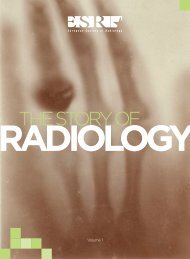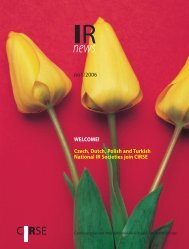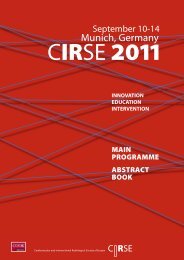first announcement - CIRSE.org
first announcement - CIRSE.org
first announcement - CIRSE.org
You also want an ePaper? Increase the reach of your titles
YUMPU automatically turns print PDFs into web optimized ePapers that Google loves.
Rome 2006<br />
Good Clinical Research Awareness Programme<br />
Good Clincial Research<br />
Good clinical trials are essential for the future of Interventional Radiology and although we see more and more good research, many<br />
of the current studies and publications are not performed according to internationally accepted standards for Good Clinical Practice.<br />
In order to get one's work published in high ranking journals, the implementation of good clinical practice is indispensable. It is<br />
essential to be aware of all the regulations and pitfalls in clinical research before starting a trial. European and a growing number of<br />
local healthcare authorities are introducing Good Clinical Practice in their regulations concerning clinical trials as well.<br />
Therefore it is essential to know about all of this before starting to research.<br />
<strong>CIRSE</strong> gives you the opportunity to learn more about this topic with a Good Clinical Practice Awareness Programme. Registration for<br />
the programme is free of charge for all <strong>CIRSE</strong> 2006 attendees. A certificate of attendance will be provided after the programme.<br />
I would urge all of those interested in clinical research in Interventional Radiology to attend this unique course.<br />
J. A. Reekers<br />
<strong>CIRSE</strong> Vice-President<br />
Saturday , September 9<br />
09:45 - 10:15<br />
Background of Good Clinical Practice<br />
At the end of this session the participant will<br />
- understand the impact of history on our current<br />
laws and guidelines<br />
- development and current status of the laws<br />
and guidelines<br />
- have a basic understanding of the applicable<br />
guidelines<br />
Saturday , September 9<br />
11:30 - 12:00<br />
EU guidelines and responsibilty<br />
At the end of this session the participant will<br />
- understand how compliance with GCP<br />
ensures that clinical trials are scientifically<br />
sound and allowing accurate reporting,<br />
interpretation and verification-<br />
- understand the importance of confidentiality<br />
- have a basic understanding of the possibility<br />
and consequences of FDA and EMEA inspections<br />
Sunday , September 10<br />
09:45 - 10:15<br />
Investigator & sponsor responsibilities<br />
according to Good Clinical Practice<br />
At the end of this session the participant will<br />
- have a basic understanding of the investigator<br />
& sponsor responsibilities in clinical<br />
research projects related to:<br />
- documentation<br />
- products / devices<br />
- protection of the safety and well being<br />
of the involved patients<br />
All sessions of the<br />
Good Clinical Research<br />
Awareness Programme<br />
will take place<br />
in Room I.<br />
C RSE<br />
Monday , September 11<br />
09:45 - 10:15<br />
Good Clinical Practice - Common findings<br />
Documentation and reporting<br />
Informed Consent Process<br />
At the end of this session the participant will<br />
- recognize the importance of obtaining<br />
informed consent<br />
- understand the importance of documentation<br />
and reporting responsibilities<br />
- have a basic understanding of how inspectors<br />
/ auditors will look and document possible<br />
findings<br />
Tuesday, September 12<br />
09:45 - 10:15<br />
Common findings 2: Protocol<br />
deviations/Device accountability<br />
At the end of this session the participant will<br />
- understand the need for a protocol and what<br />
happens when deviations occur<br />
- understands the need for device accountability<br />
and the consequences if this is not performed<br />
correctly<br />
Wednesday, September 13<br />
09:45 - 10:15<br />
Common findings 3: Major adverse events<br />
vs. serious adverse events<br />
At the end of this session the participant will<br />
- understand the difference between Adverse<br />
Events, Serious Adverse Events and Major<br />
Adverse Events<br />
- understand the need for reporting this<br />
according to the laws, guidelines and protocol<br />
This programme has been made possible by<br />
an educational grant from CORDIS, J&J<br />
29










